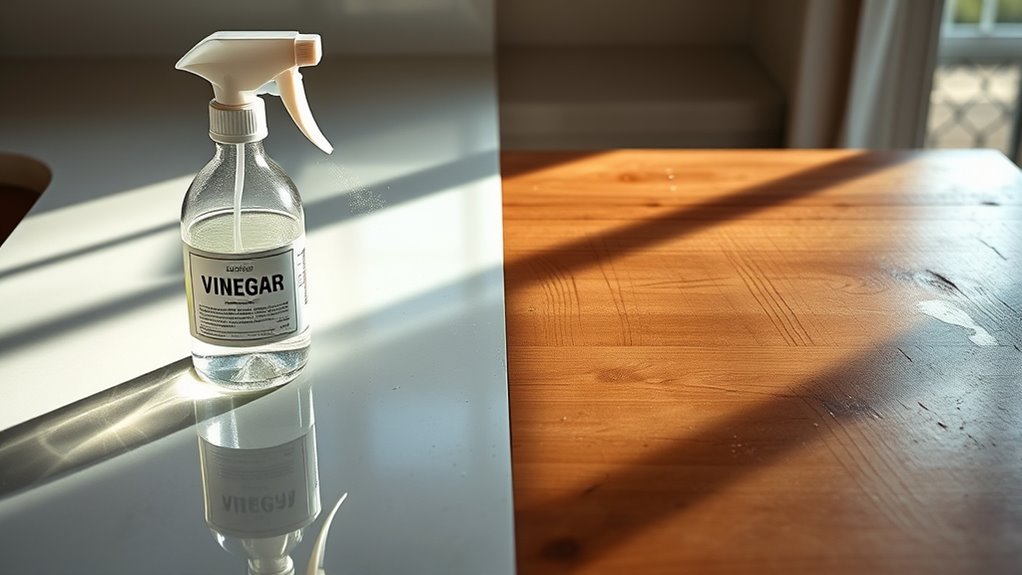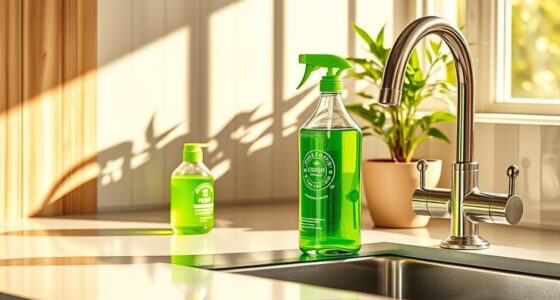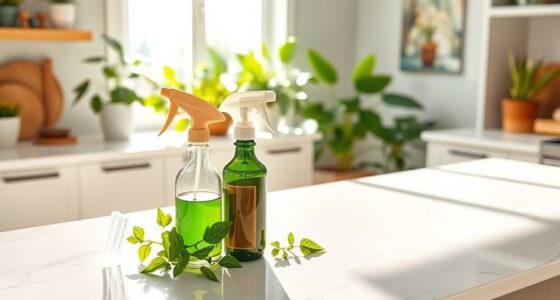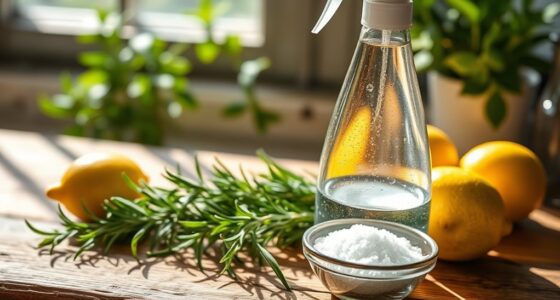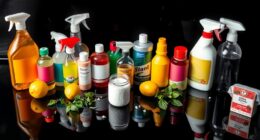Vinegar isn’t safe for all surfaces. Its high acidity can damage natural stone, hardwood floors, and certain metals, leading to etching, dullness, and corrosion. While it’s a cost-effective and eco-friendly cleaner for many surfaces, you should avoid using it on washing machines and electronic screens due to potential harm. Always test it first in a hidden area and consult guidelines for your appliances. Want to know more about safe cleaning practices? Keep exploring!
Key Takeaways
- Vinegar is effective for cleaning mineral deposits and grime but can damage certain surfaces due to its high acidity.
- Avoid using vinegar on natural stone, hardwood floors, stainless steel, chrome finishes, and washing machine components to prevent damage.
- It is cost-effective, eco-friendly, and safe for children and pets, making it a popular cleaning alternative.
- Risks include etching stone surfaces and corrosion of metal parts, which may lead to malfunctions.
- Always test vinegar on an inconspicuous area and consult manufacturer guidelines before use on appliances.
Understanding Vinegar’s Cleaning Properties
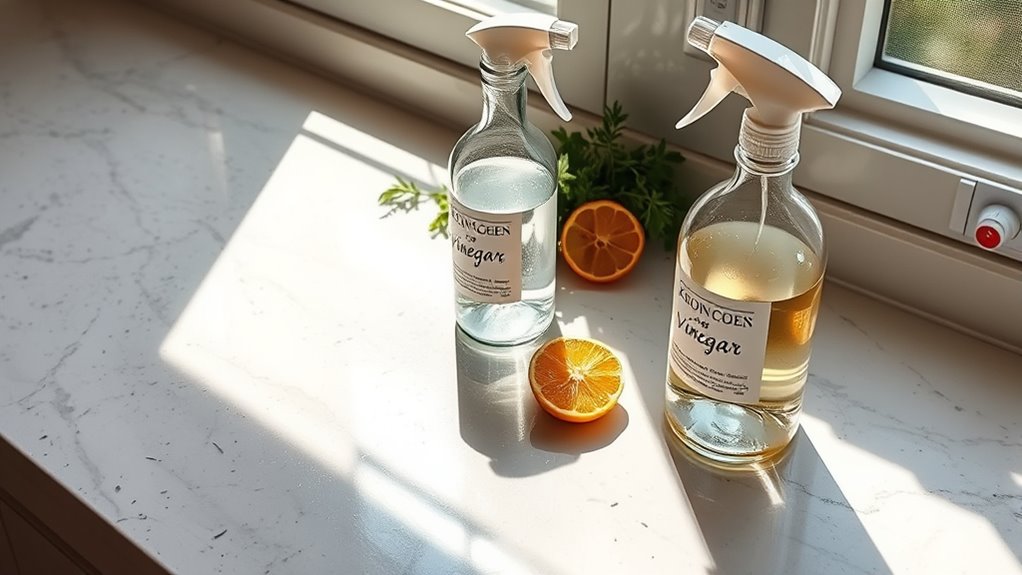
While vinegar is often hailed as a natural cleaning powerhouse, it’s important to understand its properties and limitations.
Vinegar’s cleaning properties come from its acetic acid, which effectively dissolves mineral deposits, dirt, grease, and grime. However, its high percent acidity can damage certain materials. For instance, if you use vinegar on natural stone surfaces like marble or granite, you risk etching and discoloration.
Additionally, vinegar can corrode metal components in appliances, leading to malfunctions. You might find it works well on hard water stains but less effectively on greasy messes compared to harsh cleaners.
To protect surfaces, always dilute with water and consult manufacturer guidelines before using vinegar as a cleaning agent.
Surfaces to Avoid When Using Vinegar

When it comes to cleaning with vinegar, there are several surfaces you definitely want to avoid. Its acidic nature can cause significant damage to various materials. Here’s a quick reference table:
| Surface Type | Reason for Avoidance | Alternative Cleaner |
|---|---|---|
| Natural Stone Surfaces | Can etch and dull, leading to discoloration | pH-balanced stone cleaner |
| Hardwood Floors | Dissolves wood finish, causes scratching | Wood-specific cleaner |
| Stainless Steel | Can lead to tarnishing and dullness | Mild soap and water |
| Chrome Finishes | Causes corrosion and damage | Vinegar-free polish |
| Washing Machine Parts | Damages rubber components, may cause leaks | Special appliance cleaner |
Steer clear of these surfaces to preserve their integrity while cleaning.
The Advantages of Using Vinegar for Cleaning
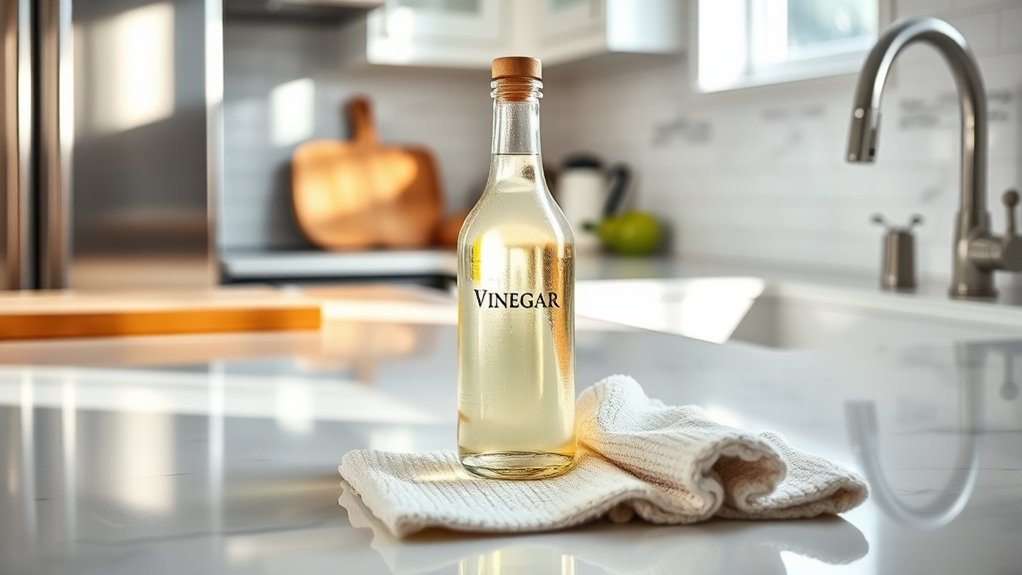
Vinegar offers an array of advantages that make it a standout choice for cleaning tasks around the home.
Vinegar is a versatile and effective cleaning solution that excels in tackling household messes.
Here are a few reasons to contemplate using vinegar to clean:
- It’s a cost-effective cleaning product, typically cheaper than commercial options.
- Distilled white vinegar effectively dissolves mineral deposits, dirt, and grime.
- Its eco-friendly nature makes it safe for use around children and pets.
Disadvantages and Risks of Vinegar in Cleaning
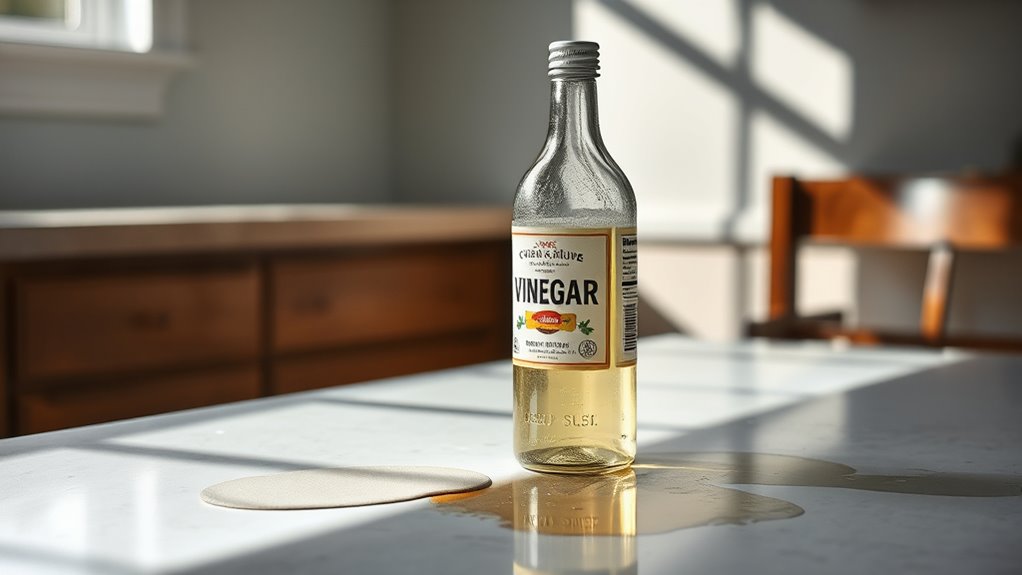
Although vinegar is often praised for its cleaning abilities, it comes with several disadvantages and risks that you should be aware of.
Vinegar can damage rubber components and hoses in washing machines, especially in front-load models, leading to leaks and costly repairs.
The acid in vinegar can etch and dull natural stone surfaces like marble and limestone, and it may dissolve the finish on hardwood floors, as many manufacturers advise against using it.
Additionally, using vinegar on electronic screens can cause pitting and corrosion, risking malfunctions and even voiding warranties.
Metal parts, particularly those made of aluminum or copper, may also suffer from pitting and corrosion, reducing their lifespan and effectiveness.
Best Practices for Using Vinegar Safely
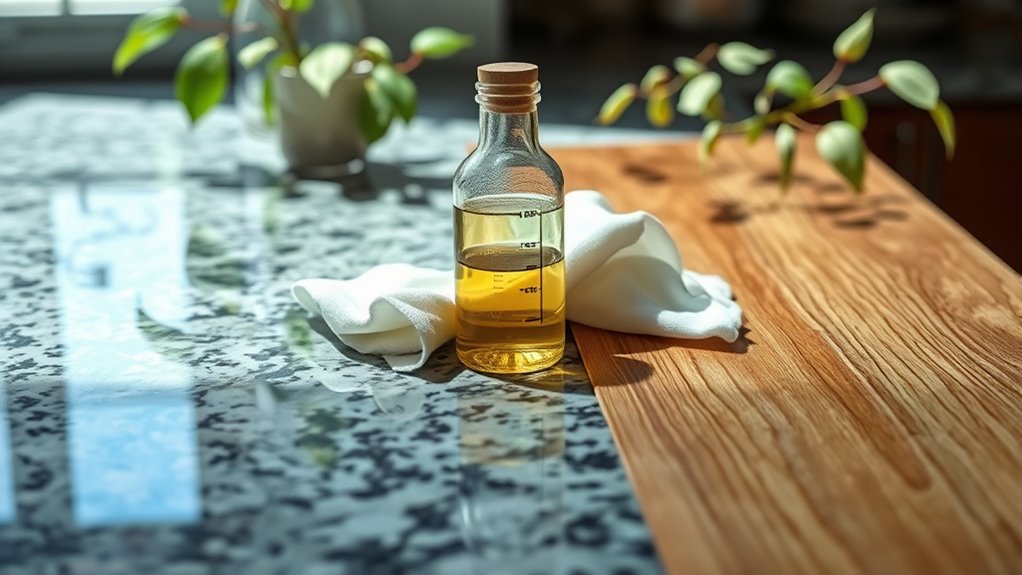
To guarantee safe and effective cleaning with vinegar, it’s crucial to follow a few best practices. Here are some tips to help you safely clean your surfaces:
For safe and effective cleaning with vinegar, always test surfaces first and avoid natural stone to prevent damage.
- Always test vinegar on an inconspicuous area before widespread use to avoid discoloration or damage.
- Avoid cleaning natural stone surfaces like granite and marble, as vinegar’s acidity can etch the finish.
- For glass surfaces, mix equal parts vinegar and water for a safe and effective cleaner.
When using vinegar, remember it’s strong enough to tackle grime but can also damage certain materials.
If you’re unsure, consult manufacturer guidelines for appliances and avoid using vinegar on electronic screens.
For tough stains, consider using baking soda instead.
Frequently Asked Questions
What Surfaces Cannot Be Cleaned With Vinegar?
You can’t use vinegar on natural stone surfaces like marble and limestone, as it’ll etch and dull the finish.
It’s also risky for wood floors, which can lose their finish and become cloudy or scratched.
Avoid using it on chrome fixtures, too, since it can tarnish their appearance.
Finally, steer clear of using vinegar on delicate fabrics like silk and wool, as it can cause discoloration and change their texture.
What Are the Disadvantages of Cleaning With Vinegar?
Did you know that nearly 30% of people experience damage to their surfaces when using vinegar for cleaning?
When you clean with vinegar, its acidic nature can etch natural stones like marble and granite, dulling their appearance over time. It can also harm your hardwood floors, leaving them cloudy and scratched.
Additionally, vinegar may corrode metal parts on appliances, leading to costly replacements. Plus, the strong odor can be off-putting for many.
Can You Use Vinegar on All Surfaces?
You can’t use vinegar on all surfaces.
While it’s great for many non-porous areas, you should steer clear of natural stone like marble and granite, as it can etch and damage them.
It’s also harmful to electronic screens and certain metals, like lower-quality stainless steel.
If you’ve got hardwood floors, vinegar isn’t a good choice either, since it can ruin the finish.
Always check before cleaning to avoid damage.
Will Vinegar Damage the Finish on a Faucet?
Imagine your shiny faucet, glistening like new. If you reach for vinegar, think twice—it can harm that beautiful finish.
The acidic nature of vinegar can corrode and dull metal, especially on decorative faucets. You might notice pitting if you use it frequently.
Instead, grab some mild dish soap and warm water for a gentle clean that keeps your faucet sparkling.
Always check the manufacturer’s guidelines to protect your investment!
Conclusion
So, while you might dream of turning your home into a sparkling sanctuary with vinegar, remember it’s not a one-size-fits-all solution. Imagine scrubbing your granite countertops only to find them dulled and unhappy, or mistaking your beloved hardwood floors for a salad dressing. Embrace vinegar’s strengths but be wary of its weaknesses. By following best practices, you can enjoy its benefits without turning your cleaning routine into a vinegar-fueled disaster. Clean wisely!

